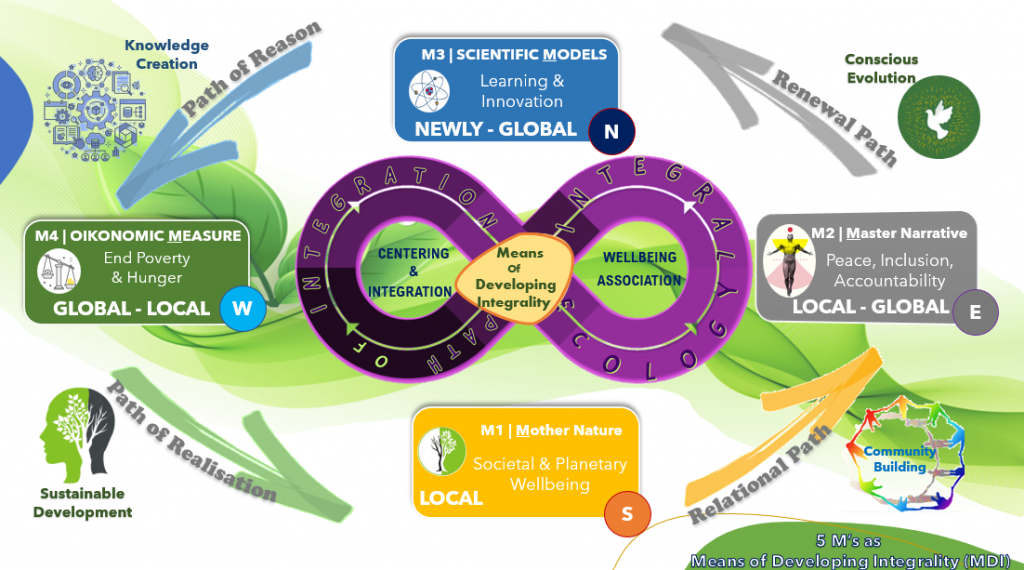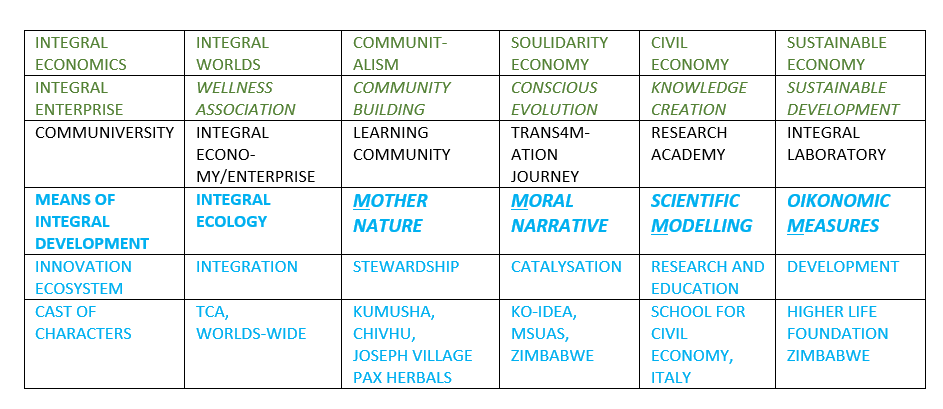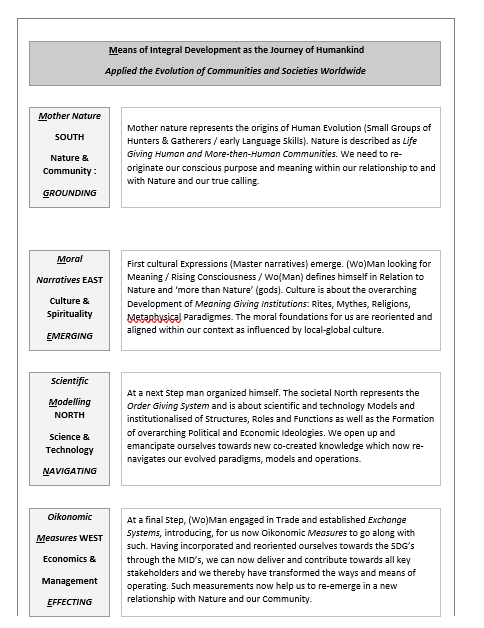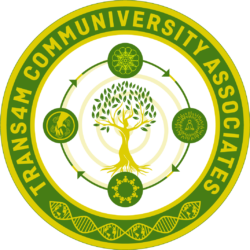Means of Developing Integrality
From the inception of the 17 UN Sustainable Development
Goals (SDGs) and 169 targets in 2015, which now have become ca. 232 indicators the
world has been pondering how these are or even, can be, implemented in the
organisations and institutions that are supposed to deliver on them. The
problem is that the SDGs are at best, signposts or metaphors as to a suggested
direction and as a result, there has been no shortage of conventional ideas and
developments in line with current thinking in accounting data in combination
with the use of technology. The recent proliferation of technology platforms that
profess to provide solutions for companies and organisations is growing into a
very highly crowded space, all with the same paradigm and from the same basis
with an emphasis on data management.

Whilst these efforts are essential and important for the development of sustainability accounting, within lies its very limitations and core issue why the SDGs will not be able to deliver on their promises for the 2030 agenda. From the origins of double entry accounting by Luca Pacioli in 15th Century Italy, its founders realised that inherent in accounting is a detachment from reality and the very fabric from which data and numbers originate. The original goal of accounting was to create harmony between natural flows within an enterprise in accordance with a “divine proportion”. [1]
We are of the opinion that much of this notion of harmony and relevance has been lost over the centuries as accounting has become more abstract and digitised as a profession and area of knowledge. However, as with many things “lost”, from the past if an evolved form of research can be engaged
with, the true origins can be resurrected and renewed to help find solutions in
the present. Our position is that for the SDGs to gain some forms of relevance and true nature, they have to be supplemented by what we now call the MIDs, Means of Integral Development.

The MIDs have in essence three sources of inspiration, firstly locally all our prior work on Community development in relation to Nature, e.g. The idea of the Communiversity, Integral Green Slovenia and Zimbabwe Integral. Secondly, deep research and development including books such as Integral Economics, Integral Research and Transformation Management amongst many others with a focus on the Integral model. Thirdly, the many other researchers and authors such as Thomas Johnson and Anders Broms [1] with Profit Beyond Measure. All of such can then be compared and contrasted with the globally based Sustainable Development Goals. [2]
Let’s start with Johnson and Broms who used the term “management by means” (MBM) first coined by the American quality guru W. Edwards Deming [3] many years ago in the following words: “If you have not got a viable system, then there is .. no point in setting a goal”. Managing by means is the antithesis of conventional digital thinking and the data-driven form of managing by results (MBR).
In conventional management, or indeed
financial, accounting terms than for Johnson and Broms [1], what gets destroyed in typical management accounting is the web of relationships that determines the character of the enterprise, its capabilities, and its capacity to learn and grow. Systems theory includes and respects the principles embedded in the relationships of Nature and these needs to be included and embodied in any work by any means.
First Natural Principle: Interdependence: Interdependent natural systems interact with each other through a web of relationships that connects everything in the universe: “relationship” expresses the essential nature of reality. During the period of the Industrial Revolution, it became apparent the need to establish primary relationships between numbers was important and as a result, the evolution was to become the practice and profession of management accounting was born.
Second Natural Principle: Self-Organization: Creative energy continually, spontaneously materializes in self-organizing forms striving to maintain their unique local self-identity. Living systems reflect the self-actualization, or unique embodiment, of creative potential in material form. As such, the very dynamic of the “How” of developing accounting becomes a prime driver of any evolution without which a system stagnates, declines, and or disappears.
Third Natural Principle: Diversity: Diversity results from the continual interaction of unique identities always relating to one another, as befits our “Integral Ecology”. From those interactions have evolved a rich variety of, for us newly global, forms. Increasingly these three principles must provide the basis for management by means, for Johnson, and Means of Integral Development, for ourselves.
Fourth Natural Principle: serves to integrate all of the above, in a macroeconomic context, and a new form of Community Building for the enterprise. This integrative dynamic, for us, is key for any organisation to flourish, as in nature, and become Sustainable, now with a big “S” and truly deliver on the SDG for the world and its humanity.
The British scientist and environmentalist James Lovelock called the world “Gaia”[2], evoking the spirit of the ancient Greek goddess of the Earth. Humanity, as being part, not separate from nature, is dependent, for its very survival on healthy natural ecosystems. As we all should know, the Earth can live without humanity, but humanity cannot live without the Earth.
The Means of Integral Development are made up of the 4-worldwide dynamics as follows:
Mother Nature (Our Integral South). Through a grounding in local community and learning, embodying the 4-C’s and CARE.
Moral Narrative (Our Integral East). Forming an Integral Ecology whilst developing a Moral narrative, as a Transformation Journey, grounded locally in the community, emerging locally-globally.
Scientific Model (Our Integral North). Building newly globally now via a “southern” and locally inspired and directed Research Academy, centered and integrated via community building, navigated via Integral Ecology (society building).
Oikonomic Measures: (Our Integral Laboratory), transforming marketing into Community Building, HR into Consciously Evolution, Operations into Knowledge Creation, and ultimately Finance into Newly Global Sustainable Development.
Built on the Integral framework, these are the four core dimensions that all human systems share, each one of them represented by a developmental research-to-innovation path, geared to address imbalances in the respective dimension: nature and community (represented by the relational research path); culture and spirituality (research path of renewal); science, systems, and technology (research path of reason); as well as enterprise and economics (represented by the research path of realisation. This transformative path leads from a narrative (grounding method of origination) to interpretive (emergent methodological foundation) to critical theory (navigational emancipatory critique) to cooperative inquiry (active transformative effect).
We are now establishing, in 2022, structurally and as a process, several Communiversities so-called, to help deliver the Means of Integral Development, and substantively an Integral Ecology centered in Forms of Community Building, indeed a “Newly Global South”.


The evolution of Enterprise in the context of attempting to reach the SDG goals needs therefore to reflect the developmental journey of humankind, without which it remains mired in the digital mindset of just attempting to generate data for accounting purposes. As with the evolutionary shift in accounting which created the conditions and needs for management accounting to evolve, here we are again at a momentous time in the need for human evolution to try and capture the essence of the SDG which Impact, and outcomes can only be delivered if we embrace e.g. the MID’s as the transformation journey.
However, we need to be realistic about the lack of capacities for organisations and their leadership to take such a step. Most breakthroughs only happen after a break-down in denial or by other means when the realisation occurs that the only way forward is break-with conventional thinking. Delivering on the SDG’s and creating anything which has sustainability is going to be a fundamentally different proposition in the Western Worlds compared to our Global South or East. We, therefore, need to start from the grounds and origins of evolutionary research which can be applied as a basis for the MIDs Foundations.
All other integral dimensions and dynamics that we described above (from community and culture to science and technology to enterprise and economy) are dependent on and need to contribute to a healthy natural environment and provide the basis and foundations for its next evolution.
Summary
The World and Humanity are still seeking a means of interpreting and working with the SDG within a dynamic framework that can deliver the goals and organisations can understand the extent of their impacts and sustainability outcomes. The SDGs, if worked with through the MID can and will provide the necessary organisational dynamic and knowledge creation necessary to help navigate and implement sustainability targets and outcome objectives.
The MIDs sits within a fully integrated methodology, model, and framework, if embraced and implemented and provide the organisation with their specific capacities and now “Means of Integral Development” for its evolution and possible transformation.
References
[1] Pacioli, L. (1494). Summa de arithmetica, geometria, proportioni et proportionalita. Paganini (Venice)
[2] Johnson H.T and Broms A (2000) Profit Beyond Measure. Extraordinary Results through Attention to Work and People. New York. Free Press
[3] United Nations (2017) The Sustainable Development Goals (2017) New York. UN
[4] Deming W.E (2018) Out of the Crisis. Cambridge. MIT Press
[5] Johnson H.T and Broms A (2000) Profit Beyond Measure. Extraordinary Results through Attention to Work and People. New York. Free Press
[6] Lovelock J (2016) Gaia: A New Look at Life on Earth. Oxford. Oxford Landmark Science

